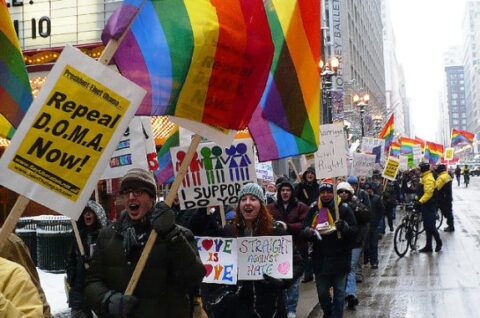Reform

As Iowa Caucuses Approach, Signatories of Iowa Compact Hope to Reframe Immigration Debate
Exhausted by the base immigration rhetoric prevalent in the GOP presidential debate, a group of concerned Iowans is seeking to reframe the issue in anticipation of the Iowa Caucuses next month. Last week, business, faith and city leaders in Iowa signed the Iowa Compact—a list of five principles meant to guide how people discuss immigration. Signatories of the compact, which is modeled after Utah and Indiana’s Compact, urged politicians “to stop playing politics on the issue” and said that state level fixes, like enforcement-only legislation, do “not address the root problem of immigration” but instead hurts economies and communities. Read More

Polls Reveal Even Conservative Voters Favor Path to Legal Status for Unauthorized Immigrants
Immigration is a hot issue in the GOP primary debates, complete with extreme anti-immigrant rhetoric and far-fetched policy proposals. Michele Bachman, for example, promised to deport every undocumented immigrant in the country—a costly and unworkable task. And she’s not the only one. Herman Cain recently “joked” that he would electrify the border fence as a deterrent for unauthorized crossers. But Republican presidential candidates have it wrong when it comes to anti-immigrant rhetoric and their base. Recent polls suggest that a majority of conservative voters actually favor a path to legal status for unauthorized immigrants. In fact, several polls found that the majority of Americans prefer a path to legalization for unauthorized immigrants currently in the U.S. Read More

Dayton, Ohio Passes Plan to Revitalize Economy through Immigrant Integration
Shortly after Alabama began implementing their anti-immigration law (HB 56), Dayton, Ohio passed legislation that welcomes and integrates immigrants with the hope that they will revitalize their slowing economy. Faced with a declining population, Dayton’s City Commission voted unanimously last week to adopt the Welcome Dayton Plan—a plan that is tapping into the very economic stimulus that Alabama is driving out. Read More

Declining Cities Look to Immigrants to Revitalize Economies and Increase University Enrollment
In a recent speech to the U.S. Chamber of Commerce, New York City Mayor Michael Bloomberg highlighted the vital role immigrants play in stimulating economic growth. Bloomberg called for immigration policies that “spur innovation, increase the number of entrepreneurs who start businesses here, and create jobs for Americans on every rung of the economic ladder." With U.S. unemployment still hovering around 9%, some declining U.S. cities are also looking to harness the economic and entrepreneurial power of immigrants. Small towns, particularly in America’s rust belt, are contemplating programs that attract immigrant growth in hopes of revitalizing their towns and universities. Read More

Bridging the Ethnic Generation Gap: Why an Aging Population Will Depend on a New Generation of Workers
There is a generation gap in the United States and it is not only a difference in age. It is a difference in color as well. The predominantly white Baby Boomers are just this year beginning to reach retirement age. As they leave the labor force and the tax base over the next two decades, a new generation of Latinos and Asians will take their place in the U.S. economy as workers and taxpayers. It is the tax dollars of these immigrants and children of immigrants which will sustain the Social Security and Medicare programs upon which the Baby Boomers will rely. And it is these immigrants and children of immigrants who will become the doctors, nurses, health aides, and countless other workers upon whom so many aging Baby Boomers will depend. Read More

President Obama Promises to Keep Promising Immigration Reform at Latino Conference
Amid frustrated shouts of “Yes, You Can!” from advocates in the audience, President Obama again deferred the power to fix our broken immigration system to Congress today during a speech at the National Council of La Raza’s (NCLR) annual conference. After highlighting his administration’s bona fides on issues important to the Latino community—appointing Justice Sonia Sotomayor on the Supreme Court, naming Labor Secretary Hilda Solis to his cabinet and delivering health care to millions of Latino families—the President turned to the thorny issue of our broken immigration system—a system many advocates believe the President should fix using the power of executive authority. Read More

What Does Record Low Migration From Mexico Mean for Immigration Reform?
In what could be an historic event, the number of unauthorized immigrants coming from Mexico to the United States has fallen drastically in recent years—dropping from 525,000 annually in 2000-2004 to fewer than 100,000 in 2010. In fact, unauthorized immigration from Mexico has dropped to a net rate of zero—meaning that the number of new migrants entering the United States each year is roughly equal to the number who leave or die. That is one of the central conclusions to emerge from new research by the Mexican Migration Project (MMP) at Princeton University and the Universidad de Guadalajara. Read More

Pending a Resolution of DOMA, Immigration Judges Should Exercise Discretion to Stay Removal Cases
BY BETH WERLIN AND VICTORIA NEILSON To date, five states plus the District of Columbia celebrate marriages of gay and lesbian couples and several other states honor such marriages. In addition, five countries, including Canada, permit marriages of gay and lesbian couples and at least fourteen additional countries recognize same-sex relationships for immigration purposes. Yet, because the U.S. immigration agencies rely on section 3 of the Defense of Marriage Act (DOMA)—defining marriage as a union between one man and one woman—lesbian and gay U.S. citizens and lawful permanent residents are barred from obtaining immigrant visas for their spouses, visas that are available to heterosexual U.S. citizens and residents with foreign-born spouses. Gay and lesbian noncitizens also are precluded from obtaining other immigration protections, including relief from removal, based on a marriage to a U.S. citizen or permanent resident. As a result, families are separated and spouses of U.S. citizens and lawful permanent residents are deported from the United States. Read More

Pending a Resolution of DOMA, Immigration Judges Should Exercise Discretion to Stay Removal Cases
BY BETH WERLIN AND VICTORIA NEILSON To date, five states plus the District of Columbia celebrate marriages of gay and lesbian couples and several other states honor such marriages. In addition, five countries, including Canada, permit marriages of gay and lesbian couples and at least fourteen additional countries recognize same-sex relationships for immigration purposes. Yet, because the U.S. immigration agencies rely on section 3 of the Defense of Marriage Act (DOMA)—defining marriage as a union between one man and one woman—lesbian and gay U.S. citizens and lawful permanent residents are barred from obtaining immigrant visas for their spouses, visas that are available to heterosexual U.S. citizens and residents with foreign-born spouses. Gay and lesbian noncitizens also are precluded from obtaining other immigration protections, including relief from removal, based on a marriage to a U.S. citizen or permanent resident. As a result, families are separated and spouses of U.S. citizens and lawful permanent residents are deported from the United States. Read More
Make a contribution
Make a direct impact on the lives of immigrants.
